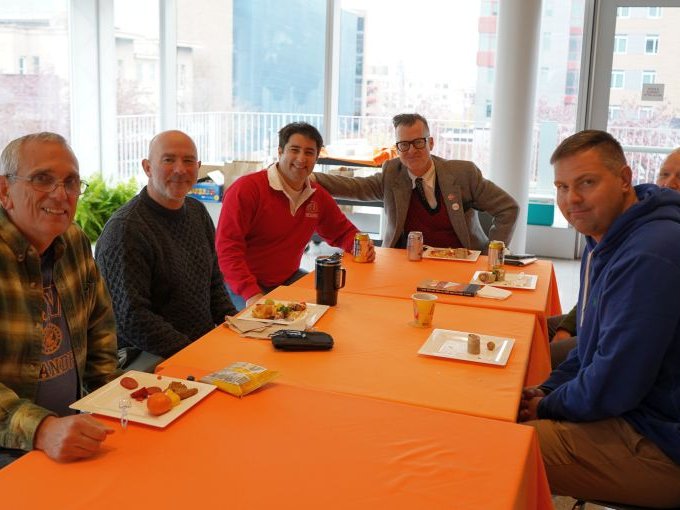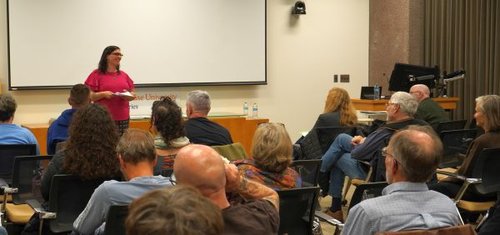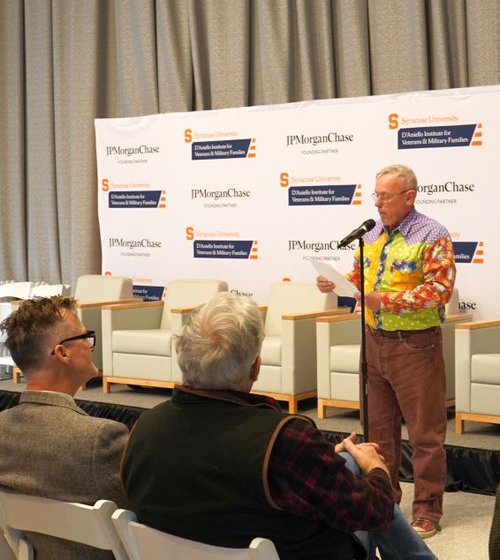Veterans Find Voice and Connection at Writing Workshop Weekend
"It's not just about writing. It's about the feeling and sense of community.”

In the weekend preceding Veteran's Day, the Daniel and Gayle D'Aniello Building became an excavation site: a place for veterans to not only recount their service but sift through their memory and experiences with reinvigorated voices. Here, writing exceeded its role as a creative outlet; it emerged as a community binder, an emotional magnifier and, to some, a healer.
Voices of Service: A Celebration of Veterans Writing and Weekend Workshop welcomed veterans of all ages and branches to embark on two days of collaborative, creative and communal development. Aligning with the Humanities Center’s 2025-2026 Syracuse Symposium theme, “Creativity," the event focused on uplifting veterans’ distinct perspectives and offered space — in the form of writing workshops, readings, shared meals and a concluding open mic — for them to nurture and empower their creative expression.
The event’s workshops included a range of hands-on writing exercises facilitated by Dewaine Farria (U.S. Marine Corps), Brian O’Hare (U.S. Marine Corps) and Jenny Pacanowski (U.S. Army). From learning about multidimensional character building to sessions of constructive feedback, attendees had opportunities to mobilize their works-in-progress and generate fresh ideas.
One of O’Hare’s sessions, “Writing as the Soundtrack of Our Lives,” asked each veteran to select a song that represented or identified with their individual service experience. It was a reflective exploration on how music attaches itself to memory, and how songs can serve as tools for unearthing moments that might have otherwise remained buried under time.
“It's a really fantastic, remarkable experience,” said John Rittell, a 33-year military retiree. “You're learning what you already know, but maybe never brought out.”
Responding to O’Hare’s prompt, Ritell was reminded of Gale Garnett’s “We’ll Sing in the Sunshine,” the first song he heard overseas while serving in the Vietnam War. To Rittell, Garnett’s tune sounded like “growing up,” a spark he built upon in the exercise.

These musings were not kept internal; the weekend encouraged writers like Rittell to share their prompted reflections openly. As Rittell understood it, “You can build on what other people have gone through.” In doing so, the group formed a network of connections out of mutual understanding, not just among fellow attendees but also with the instructors leading the workshop.
“It’s a privilege. I’m ‘rich,’ basically, in being able to connect with human beings, which is really the ultimate richness,” said O’Hare. “I love being in this environment, there’s a lot of trust and a lot of love.”
Prior to an open mic event on Sunday, Pacanowski facilitated the weekend’s final workshop that focused on the art of “releasing” stories rather than “retraumatizing.”
The result?
A microphone that echoed with the power of reclamation... in thunderous conviction, in teary eyes, in reminiscent laughs. A duality of ownership and relinquishment ushered from an array of veteran narratives, as each reading tapped on a shared experience with different hands.
Rittell’s reading began with lyrics ("We sang in the sunshine…You know we laughed everyday...") while others meditated on the mechanics of healing. Some stories recalled the loss of oneself, one’s comrades, or both. There were stories that depicted choppy navigations through homecoming and reintegration, and others that painted lighthearted memories, drawing smiles across the room.

Stitched together, the concluding open mic session created a mosaic of the multifaceted veteran experience, and the family born out of this common thread. Through communal, creative engagement, the Veterans Writing Weekend fostered an alternative remedy for healing.
“It's a way of dealing with inner conflict and pain that may be tied to service or may be tied to your childhood," said Rudyard Edick, a 28-year military retiree, referring to the intergenerational aspects of growing up with a troubled World War II veteran father. "It's way of dealing with the pain and negative emotions that arise," Edick continued. "It's not just about writing. It's about the feeling and sense of community.”
Edick belongs to the Syracuse Veteran’s Writers Group that meets monthly to write, workshop, and learn techniques behind storytelling. This group, along with the activities that took place on campus (Nov. 7-9), highlights how these veterans — though their military branch, location or dates served may vary — are not isolated in their experience or challenges.
“Writing is such, I think in general, a lonely enterprise," said Gwen Keenan (Coast Guard). Coming together with people and getting feedback helped Keenan realize, "oh, somebody else struggles with that," recognizing how creative work within these programs helps compose a new narrative around “service.”
“It's not all trauma. A lot of it's like, what was really important to you, and what did you take away from it?” Keenan said. “And so, if you get veterans to write about it and it's shared with a wider audience, you build an appreciation and maybe an understanding of service for the broader population, which I think is important as fewer and fewer people serve.”
The Writing Workshop Weekend evocatively celebrated veteran stories, moving beyond the sometimes-performative “thank you for your service” nods or the corporate discounts on veterans’ meals O’Hare joked about. Instead, the celebration marked an effort to cultivate space for these stories, to empower and amplify veteran voices.
Eileen Schell, the event’s host and professor of Writing and Rhetoric at Syracuse University, put it best: “The best way to celebrate Veteran’s Day is to listen.”
Voices of Service: A Celebration of Veterans Writing and Weekend Workshop was made possible by partnerships between the Syracuse University Press, Syracuse University Libraries, the Syracuse University D’Aniello Institute for Veteran & Military Families (IVMF), the National Veterans Resource Center (NVRC), the Moral Injury Project of Hendricks Chapel, and the Syracuse University Humanities Center.
